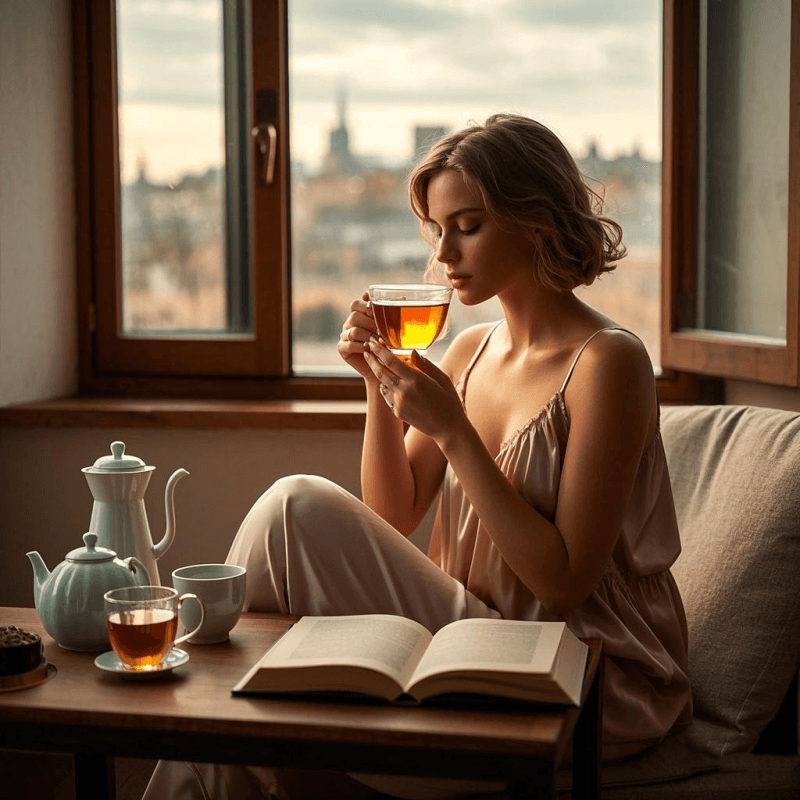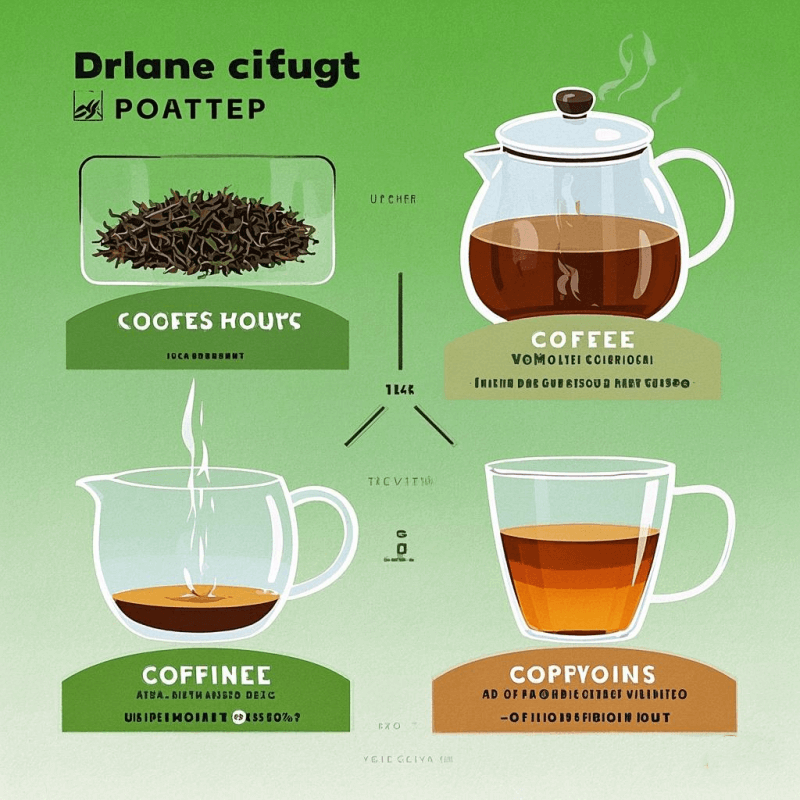Is There Caffeine in Oolong Tea?

1. Introduction: Why “Is There Caffeine in Oolong Tea” Matters
In a world where beverage choices impact energy levels, sleep patterns, and overall wellness, the question “is there caffeine in oolong tea” has gained significant traction. A 2024 survey by Global Tea Insights revealed that 68% of tea consumers actively consider caffeine content when selecting their daily brews, driven by a desire to balance stimulation with health goals. Unlike the straightforward profiles of black tea or coffee, oolong tea occupies a unique middle ground due to its semi-oxidized nature, making its caffeine content both a curiosity and a critical factor in daily consumption decisions. This article explores the science behind oolong tea’s caffeine, its effects on the body, and whether incorporating it into your daily routine is right for you.
2. What Is Oolong Tea? The Art of Semi-Oxidation
Is There Caffeine in Oolong Tea?
Oolong tea is a traditional Chinese tea made from Camellia sinensis leaves that undergo partial oxidation (10–80%), placing it on a spectrum between minimally oxidized green tea and fully oxidized black tea. This unique processing method gives oolong tea its diverse flavor profile—ranging from the delicate floral notes of Taiwanese Alishan to the robust, roasted aromas of Wuyi Rock Tea.
Key Steps in Oolong Production:
- Withering: Freshly plucked leaves are air-dried in the sun or shade to reduce moisture content and activate enzymes that initiate oxidation.
- Oxidation (Tossing): Leaves are gently tossed in bamboo baskets to bruise their edges, exposing them to air and allowing controlled oxidation. The duration of this step determines the tea’s flavor: shorter times for light, fruity oolongs; longer times for deep, smoky varieties.
- Firing: Oxidation is halted by pan-firing or baking the leaves, stabilizing their chemical composition and locking in flavor. Some oolongs, like Da Hong Pao, undergo additional charcoal roasting to enhance complexity.
As The Tea Institute explains, this balance of oxidation and heat treatment not only shapes oolong tea’s taste but also influences how its natural caffeine interacts with other compounds, such as polyphenols and amino acids.
3. Is There Caffeine in Oolong Tea? A Scientific Perspective
Is There Caffeine in Oolong Tea?
Yes, oolong tea contains caffeine, but its levels vary significantly based on processing and brewing methods. Like all true teas, caffeine is a natural component of Camellia sinensis leaves, serving as a protective compound in the plant. However, the degree of oxidation and leaf selection play key roles in determining extractable caffeine:
Factors Influencing Caffeine Content:Is There Caffeine in Oolong Tea?
- Oxidation Level:
- Lightly Oxidized (10–30%): Teas like Tie Guan Yin or Alishan High Mountain retain more bound caffeine, yielding 30–40mg per 8oz cup. Their delicate processing preserves a balance of stimulation and L-theanine, an amino acid that promotes relaxation.
- Heavily Oxidized (60–80%): Varieties like Da Hong Pao or Phoenix Dan Cong undergo deeper oxidation, breaking down caffeine-polyphenol bonds and increasing extractable caffeine to 50–60mg per cup.
- Leaf Maturity: Younger leaves and buds, rich in secondary metabolites, contain higher caffeine concentrations than older, mature leaves.
- Brewing Technique: Stronger brews (higher leaf ratio, hotter water, longer steeping) extract more caffeine. For example, a gongfu-style steep with 7g of tea in 150ml water yields the highest caffeine, while a casual Western brew with 3g in 240ml is more moderate.

A study published in Healthline highlights that oolong tea’s caffeine is uniquely paired with L-theanine, creating a synergistic effect that enhances focus without the jitters associated with coffee or energy drinks.
4. Oolong Tea vs Other Caffeinated Beverages: A Side-by-Side Comparison
Is There Caffeine in Oolong Tea:
Understanding how oolong tea stacks up against other drinks can help you manage caffeine intake effectively:
Caffeine Content per 8oz Serving
| Beverage | Caffeine (mg) | Key Characteristics |
| Oolong Tea | 30–60 | Semi-oxidized; balanced stimulation with L-theanine |
| Black Tea | 40–70 | Fully oxidized; stronger, quicker caffeine hit |
| Green Tea | 20–45 | Minimally oxidized; gentle lift with high catechins |
| Coffee (Brewed) | 95–200 | Strongest caffeine; potential for jitters and crashes |
| Energy Drink | 70–160 | High caffeine + sugar; rapid onset, short-lived energy |
| Decaf Tea/Coffee | <5 | Negligible caffeine; ideal for sensitive individuals |
What This Means for Your Routine:
- Oolong tea offers a “Goldilocks” dose—enough to boost alertness (30–60mg) without overwhelming the system, making it suitable for most adults when consumed within FDA-recommended limits (400mg daily).
5. Daily Caffeine Intake from Oolong Tea: Benefits and Considerations
Is There Caffeine in Oolong Tea?
🌟 Potential Health Benefits
- Cognitive Performance: A 2023 study in the Journal of Caffeine Research found that 50mg of caffeine (common in a cup of moderately oxidized oolong) improves reaction time and working memory by 15–20%. The L-theanine in oolong tea further promotes alpha brain waves, enhancing focus and reducing stress.
- Metabolic Support: Caffeine in oolong tea increases thermogenesis, helping the body burn calories more efficiently. Combined with polyphenols like catechins, this may support weight management; a landmark study in Obesity Reviews linked daily oolong consumption to reduced body fat over 12 weeks.
- Heart Health: Moderate daily intake (3–4 cups) is associated with improved blood vessel elasticity and a lower risk of cardiovascular diseases, thanks to caffeine’s anti-inflammatory effects and the tea’s rich antioxidant profile.
⚠️ Potential Risks and Considerations
Is There Caffeine in Oolong Tea?
- Sleep Disruption: Consuming oolong tea within 4–6 hours of bedtime may interfere with sleep for sensitive individuals, as caffeine has a half-life of 3–5 hours.
- Digestive Sensitivity: Excessive intake (6+ cups daily) can lead to stomach irritation or acid reflux, especially in those with sensitive digestive systems.
- Caffeine Tolerance: Regular consumption may reduce the perceived effects of caffeine over time. Cycling between caffeinated and caffeine-free beverages can help maintain its benefits.
6. Who Should (and Shouldn’t) Drink Oolong Tea Daily?
Is There Caffeine in Oolong Tea?
👥 Ideal for Daily Consumption If You:
- Seek Balanced Energy: Prefer a steady, non-jittery focus over the sharp buzz of coffee. Lightly or moderately oxidized oolongs (30–50mg caffeine) are ideal.
- Manage Weight or Metabolism: Benefit from the thermogenic effects of caffeine combined with oolong tea’s polyphenols.
- Enjoy Complex Flavors: Appreciate the diverse taste profiles of oolong, from floral to roasted, and want a beverage that complements both quiet mornings and social occasions.
❗ Caution If You:
- Are Sensitive to Caffeine: Experience anxiety, restlessness, or sleep issues with even moderate caffeine. Opt for decaf options or limit intake to 1–2 cups of lightly oxidized oolong.
- Have Health Conditions: Consult a doctor if you have hypertension, arrhythmia, or digestive disorders, as caffeine may interact with certain medications or exacerbate symptoms.
- Drink Late in the Day: Avoid consuming oolong tea after 2 PM to prevent sleep disturbances, especially with heavily oxidized varieties (50–60mg caffeine).
7. Conclusion: Balance Is Key to Enjoying Oolong Tea Daily
Is There Caffeine in Oolong Tea?
The answer to “is there caffeine in oolong tea” is a resounding yes—but its semi-oxidized nature offers a caffeine experience that’s uniquely adaptable to individual needs. With 30–60mg per cup, oolong tea provides a moderate stimulant effect paired with the calming benefits of L-theanine, making it a versatile choice for daily consumption when enjoyed mindfully.
By considering your caffeine tolerance, health goals, and flavor preferences, you can harness the benefits of oolong tea while avoiding potential downsides. Whether you opt for the gentle lift of a lightly oxidized Alishan or the robust energy of a roasted Da Hong Pao, the key is balance: stay within recommended caffeine limits, pay attention to your body’s responses, and savor the rich complexity this tea has to offer.
Ready to explore oolong tea’s diverse caffeine spectrum? Discover the smooth complexity of oolong tea in our premium collection, featuring handpicked varieties from heritage farms. From delicate brews to bold blends, find the perfect oolong tea to enhance your daily routine—one cup at a time.
Wondering is there caffeine in oolong tea? Uncover its caffeine levels, daily consumption benefits, and who it’s best for. Balance energy and wellness—click to find your ideal brew!
